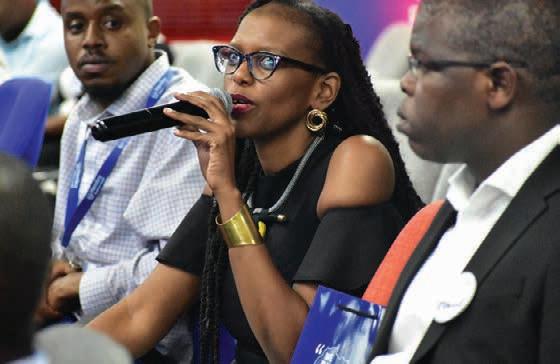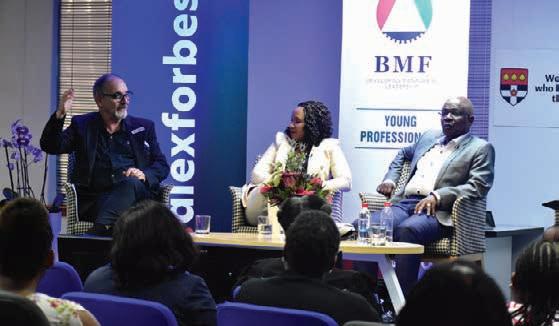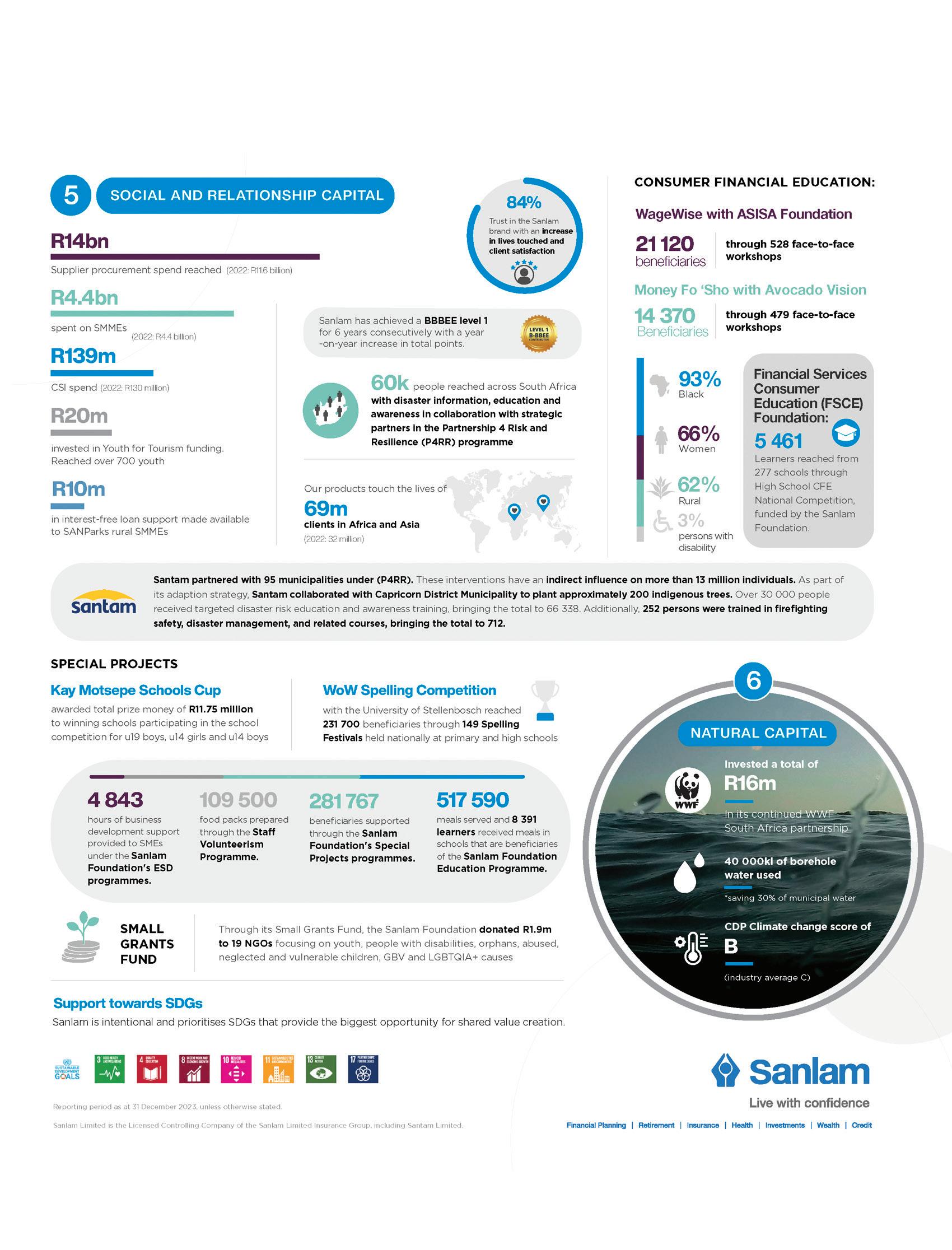



























































































































































BMF acting president: Lilly Moabi
BMF editorial team:
Managing director: Monde Ndlovu
Head of communications, marketing and events: Khulukazi Mtebele
Editorial Board chairperson: Papama Mnqandi
Address: The Eric Mafuna House, 12 Summer Street, Rivonia, Sandton, Gauteng, 2196 www.bmfonline.co.za
PUBLISHED BY
TPicasso Headline, a proud division of Arena Holdings (Pty) Ltd
Hill on Empire, 16 Empire Road (cnr Hillside Road), Parktown, Johannesburg, 2193
Postal Address: PO Box 12500, Mill Street, Cape Town, 8010
VAT Number: 4730261205
Contact Person: Lodewyk van der Walt
Tel: +27 21 469 2400 | Fax: +27 86 682 2926 www.businessmediamags.co.za
EDITORIAL
Editor: Ryland Fisher
Content Manager: Raina Julies rainaj@picasso.co.za
Contributors: Thulisile Buthelezi, Reginald Demana, Dr Troy Dyer, Mwangi Githahu, Siyabonga Hadebe, Papama Mnqandi, Lilly Moabi, Busani Moyo, Professor Parmi Natesan, Monde Ndlovu
Copy Editor: Brenda Bryden
Content Co-ordinator: Natasha Maneveldt
Digital Editor: Stacey Visser vissers@businessmediamags.co.za
DESIGN
Head of Design: Jayne Macé-Ferguson
Advert Designer: Bulelwa Sotashe Cover Image: Supplied
Project Manager: Jerome van der Merwe jeromem@picasso.co.za
Tel: +27 21 469 2484 | 082 668 1496
Sales: Frank Simons
PRODUCTION
Production Editor: Shamiela Brenner
Advertising Co-ordinator: Shamiela Brenner
Subscriptions and Distribution:
Fatima Dramat | fatimad@picasso.co.za
Printer: CTP Printers, Cape Town
MANAGEMENT
Management Accountant: Deidre Musha
Business Manager: Lodewyk van der Walt
General Manager, Magazines: Jocelyne Bayer
Copyright: Picasso Headline. No portion of this magazine may be reproduced in any form without written consent of the publisher. The publisher is not responsible for unsolicited material. African Leader is published by Picasso Headline. The opinions expressed are not necessarily those of Picasso Headline. All advertisements/advertorials have been paid for and therefore do not carry any endorsement by the publisher.
his issue follows a theme of accelerating economic justice and focusing on deepening the gains of democracy.
We try to re ect as many diverse voices as possible as we grapple with some big issues facing our beautiful country and continent. We consider how well we have done over the past 30 years and how well we should have done.
We speak to former South African president Kgalema Mothlanthe about the great work he and a team of esteemed South Africans did a few years ago that could have changed the trajectory of parliament’s work.
We try to re ect the views of some CEOs of major companies and some Black
5 MD’S NOTE
As we enter the 48th year of the Black Management Forum and the 30th year of democracy, we nd ourselves at another crossroads in rede ning ourselves and the country.
6 PRESIDENT’S NOTE
South Africa deserves a leadership that is consumed by its development and ensures success; that way, we will know that the country is steering in the right direction.
7 EDITORIAL COMMITTEE MESSAGE
The BMF and African Leader play a crucial role in stimulating debate around transformation and furthering democracy.
8 IN CONVERSATION WITH Former president Kgalema Motlanthe opines a lost opportunity when parliament assembled a high-level panel to assess the impact of legislation passed since 1994 and never implemented any of the recommendations made in the report compiled by the panel.
12 BMF EVENTS
A roundup of the post-SoNA dialogue; BMF provincial visits; the Annual Lot Ndlovu Lecture; and the BMF National Conference.
Management Forum leaders about these issues to nd solutions that will make our country better for the majority of her citizens. This is the rst time I have edited this publication, and what I like about it is its unapologetic stance on the socioeconomic transformation of our society and the upliftment of those who might not have had access to economic opportunities in the past.
The mark of a good African leader is one who always tries to uplift his whole village along with the rest of society.
Enjoy the read.
Ryland Fisher Editor
16 ECONOMIC TRANSFORMATION
How effective has the nation been in accelerating economic transformation and inclusion?
19 BMF YOUNG PROFESSIONALS
Young professionals represent the promise and potential of a nation striving for inclusivity, equity and economic prosperity.
20 A RETROSPECTIVE OF 30 YEARS OF DEMOCRACY
South Africa’s sector charters and codes is one win area for inclusivity and transformation.
22 INFRASTRUCTURE
The national roads agency is investing billions into infrastructure development aimed at boosting the economy, creating jobs and uplifting communities.
23
A reimagined Afro-centric business leadership is needed to drive Africa’s future and transformation.
24
What is the role of strategy and strategic management in developing resilience?
26
We look at the bene ts of having greater female participation in the workplace.

MONDE NDLOVU, BMF managing director, shares why we need to think about how we are developing manager-leaders today and in the future
Entering the 48th year of the Black Management Forum (BMF) and the 30th year of democracy, we nd ourselves at another crossroads in rede ning both ourselves and the country. At the centre of it all is the presence of leadership and its role. Not only this, but also how leadership is developed and prepared for high echelons of responsibility in the country and beyond.
The BMF has, to a certain extent, played a signi cant role in developing and advocating for managerial leadership in South Africa.
Our philosophical understanding of leadership is seen in our bold assertion that we develop “managerial leadership”. In business school, we separate management and leadership as separate concepts. However, in the BMF, we join them deliberately because our thinking of development involves creating a person that encompasses both spheres in one. They are a manager and a leader at the same time, tapping into understanding legitimate authority and the power of inspiring individuals.
This places the BMF on a higher playing eld, and therefore this understanding challenges every member of the BMF to possess all the attributes and qualities of a manager and leader at the same time.
We have always argued that we cannot remain in the space of developing leadership when the environment has created boundaries for black talent not to thrive.

Just like a farmer who plants seeds on fertile ground, we, too, need to check if the soil is conducive to the type of seeds we want to plant as a society. Through this understanding, we delved into the development of the af rmative action blueprint of 1993, whose purpose is to work on the “soil” and prepare it for the presence of black talent.
We therefore must re ect on this work of preparing the soil: how far have we come, and does the current soil need more intervention? The answer to this question is a de nite yes – we still need more intervention to ensure that our vision of management control is realised in South Africa, and, most importantly, maintained.
Management control is at the heart of any organisation and the economy. Whoever controls management controls the direction and implementation of strategy. Our representation at top
management is still very poor – black Africans remain below 20 per cent, and we see other race groups promoted, recruited and trained, which signals that power reproduces itself in a particular way. Our drive to change this pattern has shaken the system, and we need to continue along the path of transforming organisational management until it looks, thinks and ideates like us. This is possible.
Our greatest task is to ensure we give corporate a new identity premised on our understanding of business and values. Power must continue to be challenged at the highest levels until the economy resembles us.
The role of the BMF remains more relevant today than it was before. The need for capacity-building cannot be understated; it is an ongoing need for the economy and leadership in general. We must continue to think about how we are developing managers and leaders today, especially with reference to the next 50 years of the BMF. In which sectors do we need leadership, and how do we keep up with the principle of succession and produce a pipeline of leadership?
We must stress and state this: we do not become members of the BMF to lead it, but we become members to be equipped to lead outside the BMF and to display the values and principles of the organisation in every leadership space possible in the country and beyond.
Our greatest task is to ensure we give corporate a new identity premised on our understanding of business and values.
LILLY MOABI, acting president of the BMF, shares that the organisation continues to advocate for transformation, especially for women assuming decision-making leadership roles
Ayear ago, when I came into of ce, the Black Management Forum (BMF) had a dark cloud over it. Since then, the board and I have worked tirelessly to return the BMF to its former glory and raise it to greater heights by resuscitating previous stakeholder relationships, growing our pool of stakeholders and maintaining our relations with others.
Our annual Corporate Update Dinner (CUD) will see us foster collaboration, advance advocacy efforts and promote positive economic engagement. With this year’s CUD theme. “Economic Empowerment: An Anchor for Democracy”, we will delve into the 30-year-old democratic South Africa, the successes, the failures and what the future holds for her.
Last year (2023) was a tough year economically for all. We experienced increasing interest rates, the highest unemployment rate and the longest period of load shedding and, as a result, a shrinking economy. The greater the challenges at a leadership level, the greater the societal challenges, and we have been privy to that.
We therefore need ethical transformative leaders to be anchored in transformation and unlock inclusivity to drive a growing economy. South Africa deserves a leadership that is

consumed by its development and that ensures success. That way, we will know the country is steering in the right direction. It is said that everything starts and ends with leadership.
As such, the BMF continues to advocate for transformation, especially for women assuming decision-making leadership roles. We need companies that will implement female-speci c programmes early in women’s careers to help develop their skills and con dence, putting them on track to take on leadership roles in future.
Programmes, such as the Women In Power Programme by Duke Corporate Education, catering to BMF women, are examples of what we need. We cannot
We need companies that will implement female-specific programmes early in women’s careers to help develop their skills and confidence.
wait another 30 years to witness a female president of the country. There needs to be a speci c and targeted plan from leadership to develop female talent. Therefore, women ought to be at the top of the list when companies want to develop their employees. It was a privilege to witness the country’s president nominate a woman to succeed Judge Zondo as the next Chief Justice. This was a momentous moment where women, particularly those of colour, saw the possibility of a dream realised.
Globally, we have seen women breaking barriers, shattering stereotypes and assuming positions of in uence and authority in various sectors. This re ects the growing recognition of women’s invaluable contribution to governance, academia, business and civil society.
Despite this progress, women continue to face barriers, such as gender norms, cultural biases, and gender-based violence, in their leadership roles. These barriers hinder women from advancing in leadership roles and often discourage others from aspiring to such roles.
However, despite these challenges, other women are forging their way by breaking barriers through determination, resilience and discipline.
May we, as women, nd it vital to play a signi cant role in mentoring younger women in the workplace, especially when you are an executive. May it be a deliberate action to empower another woman. We could be the support system that our workplaces and ultimately the country needs.
PAPAMA MNQANDI, chair of the BMF editorial committee, writes that the BMF and African Leader play a crucial role in stimulating debate around transformation
The 60th edition of African Leader went to print on the eve of our national general election. South Africans headed to the polls on 29 May to vote and mark 30 years of our democracy.
This means African Leader must serve as an important collection of insights and re ections from some of the nation and continent’s leading minds. We must crucially take stock of how far we have come and vote for the future cohort of (South) African Leader(s) to serve the next three decades of our society’s evolution.
Much has been said about the importance of the general election, with the political arena and terrain of ideas abuzz with all manner of catchphrases such as “2024 is our 1994.” With the BMF demonstrating 48 years of institutional resilience, the African Leader publication has the important function of sifting through the noise and bringing to the fore sober perspectives that will equip professionals, managers and leaders with the key concepts, categories and ideas with which to interpret our own reality.
Our leaders must possess the vision to compete for a just and equitable future for socioeconomic South Africa. The reservoir of thought leadership contained in the African Leader library will challenge imagination, stimulate debate and energise our public sphere in ways that elevate the standard of transformative discourse today and for tomorrow. The ideas that ow here get us back on our suspended commitment to the development and empowerment of all South Africans and give us the

vocabulary needed to call things by their names.
In the second edition of the biography of Prof Wiseman Nkuhlu (BMF president: 1992–1996), the author recounts the challenge of leading the BMF during the transition and contending with the legacy of post-independence governments on the African continent. He says: “Wiseman worked diligently and in harmony with these colleagues in the BMF to in uence the debate on high-level skills and the democratisation of the economy. In due course, they made representations to the newly elected democratic government on the fundamental subject of af rmative action.”
For those who have repeatedly proclaimed the widely held sentiment
that 2024 is our 1994, Prof Nkuhlu and others of his generation and ilk serve as cardinals and beacons for those of us who must work diligently and harmoniously in the BMF and through this publication to in uence South African and African debate.
Sadly, 30 years on, the debate still has to confront the questions of high-level skills and the democratisation of South Africa’s highly concentrated and untransformed economy.
In Prof Nkhulu’s memoir, the author further states, “it became clear to the BMF during its initial engagement with the ANC leadership that there was no de nite policy on how the advancement of blacks to management positions was going to be achieved. BMF advocacy therefore played a crucial role in shaping the development of appropriate policies on employment equity and later on the promulgation of legislation on BEE”.
It is against this backdrop of the BMF of 1994 that we print this 60th edition of African Leader in 2024. The challenge placed squarely at the hands of the BMF today remains that of “Accelerating Economic Transformation, building new communities, reviewing legislation and addressing black ownership”.
The debate on high-level skills and democratisation of the economy is as important today as it was in 1994. This edition must in uence those among us who will necessarily engage the African Leader(s) we will soon elect.
The debate on high-level skills and democratisation of the economy is as important today as it was in 1994.
In 2016, parliament assembled a high-level panel to assess the impact of legislation passed since 1994. But the recommendations of the report were never implemented. RYLAND FISHER asked the panel’s chairperson, former president Kgalema Motlanthe, what happened


Former president Kgalema Motlanthe feels that parliament lost a golden opportunity to deal effectively with land redistribution, especially after it ignored recommendations made at the “High-Level Panel on the Assessment of Key Legislation and the Acceleration of Fundamental Change” that he chaired.
Motlanthe, who was president from September 2008 to May 2009, was asked, in December 2015, by the Speakers’ Forum, to chair the panel, which would look at the impact of legislation passed since South Africa became a democracy in 1994.
The Speakers’ Forum consists of the speakers of all legislatures – including the National Assembly and the National Council of Provinces.
“They decided to establish the high-level panel because, when they rounded up the Fourth Parliament, they resolved that an assessment of impact arising from legislation passed since 1994 should be conducted. Therefore, in the Fifth Parliament, the Speakers’ Forum established the panel,” Motlanthe said in an interview.
“The high-level panel’s mandate was to look at and assess the impact of legislation passed since 1994, mainly in the areas of unemployment, poverty, inequality and creation of and equitable distribution of wealth. The other area of focus was land reform, including redistribution of land, restitution of land and tenure security. The third and last focus area was nation-building and social cohesion.”
The panel consisted of:
•Dr Olive Shisana, president and CEO
– Evidence Based Solutions
•Prof Haroon Bhorat, professor of economics and director of the
Development Policy Research Unit, University of Cape Town
•Prof Alan Hirsch, director, Graduate School of Development Policy and Practice, University of Cape Town
•Mr Paul Harris, FirstRand founder
•Mr Thulani Tshefuta, president of the South African Youth Council
•Dr Aninka Claassens, land reform specialist, University of Cape Town
•Rev Malcolm Damon, CEO of Southern African Network on Inequality and founder member of the Economic Justice Network (EJN)
•Dr Terence Nombembe, former auditor-general
•Judge Navi Pillay, former United Nations Human Rights commissioner
•Ms Brigitte Mabandla, former cabinet minister
•Prof Eddy Maloka, CEO of the Secretariat of the African Peer Review Mechanism
•Prof Vivienne Taylor, Social Policy & Development, University of Cape Town
•Dr Yvonne Muthien, nonexecutive director and chairperson of companies.
“We had to do a compendium of all laws passed since 1994 with a view to assess their impact in the three key focus areas. We divided into three working groups to focus more in detail on the laws that sort of relate to each area of focus.
“From time to time, we had plenary sessions where we assessed our progress,” Motlanthe explained.
“It took 21 months of crisscrossing the country. Literally, we spent several days in each province listening to various stakeholders and communities.
“We also commissioned certain research from experts to help us better understand the various aspects of our mandate.
“We had to do a compendium of all laws passed since 1994 with a view to assess their impact in the three key focus areas.” – Kgalema Motlanthe
“Eventually, in September 2017, after 21 months, we compiled the report with recommendations.”
Motlanthe said the report identi ed priority areas that needed immediate attention from parliament, as well as those that were mid- or long-term.
“We classi ed our recommendations in that manner, and if you read the report, you will see that recommendations are contained in boxes. We felt that, given the size of the report, it might be too daunting for MPs to go through it page by page, and those who wanted to go into the recommendations would go straight into the boxes.”
The report contained plenty of working documents, supporting documents, research papers and all the accounts from the lived experiences of ordinary South Africans.
The report was meant to be a working document for parliamentarians, but, unfortunately, parliament did not act on it, Motlanthe said.
“We dealt extensively with the land question, including land ownership, restitution, redistribution and security of tenure. Yet, the Sixth Parliament went out to obtain views on whether section 25 of the Constitution is suf cient in terms of addressing the expropriation question. They, effectively, repeated what we had already done.
“Section 25 of the Constitution makes provision for expropriation of land in public interests and public good and stipulates what the approach ought to be. It stipulates that, rst and foremost, the history of how the land was acquired in the rst instance has to be taken into account. It also has to consider how much it cost, who bought it, what is it being used for and if there are any improvements on that piece of land or not.
“Parliamentarians then took the view that section 25 of the Constitution is implicit, and they wanted it to be explicit so that you could expropriate without compensation. Instead of dealing with the land question, they dealt with the Constitution. In the end, their own report was left in abeyance. They did nothing about it. No one even asked for our opinion or input.”
“The work done by the high-level panel and the report itself is available, it is the property of parliament,” Motlanthe commented.
“All that is required with regards to the land question, for instance, is that a law of general application should be passed by parliament. That law has not been passed to this day, yet this was part of the recommendations of the high-level panel.
“We even had lawyers crafting a bill that illustrated what the bill should look like. These are all there in the archives of parliament.”
Motlanthe said that the report should have resulted in an action plan for parliament, but it is clear that most parliamentarians never even looked at the report, which is more than 600 pages long.
“Remember parliament is a tribune of the people. It represents the people. It holds the executive to account. Most of the recommendations meant that parliamentarians would also pay attention to the budgets before passing the budgets. Parliamentarians were meant to be armed by the recommendations of the report to hold the executive to account and also in uence the budgets that were adopted. That is how you give effect to the recommendations, but my sense was that those who read it were very few.”
Motlanthe does not hold out hope of the Seventh Parliament giving any kind of prominence to his panel’s report.
“It all depends really on whether they would be seized with the concern of communities. Maybe someone would say, look, do not reinvent the wheel, just go and look at those recommendations and work on them.
“The report belongs to parliament. The mandate and the oath of of ce of parliamentarians means they are public representatives. They, more than the executive, represent the people. Parliament is meant to give a voice to the people.”
Motlanthe feels that a leader must be someone who embodies the values, norms and modes of a nation.
“It must be someone with a sense of duty and integrity – you are given a privilege to lead for a certain period. It is never permanent. It is not your gift as an individual. It is the people electing you to lead them.
“One of the qualities of leadership is the appreciation and understanding that there are leaders outside of yourself. You should tap into the resources of intellectuals, activists and ordinary people because ordinary citizens do not only have demands, they also have suggestions, and they know what their priorities are.
As a leader you need to have the ability to listen and really, truly hear feedback from the people you are leading.”
Clearly, leadership from parliament was lacking when it came to the treatment of the report prepared by the high-level panel Motlanthe chaired.
THE HIGH LEVEL PANEL ON THE ASSESSMENT OF KEY LEGISLATION AND THE ACCELERATION OF FUNDAMENTAL CHANGE REPORT.





Arecent 2024 post-SoNA (State of the Nation Address) dialogue, hosted in collaboration with Henley Business School and Alex Forbes, saw a harmonious convergence of critical and constructive voices.
The purpose of the event was to re ect not only on the SoNA, but also on any other issue at play in the country needing the attention of attendees.
The panellists were Professor Jon Foster-Pedley, dean of Henley Business School, Professor Wiseman Nkuhlu, BMF past president and rst black person
to qualify as a chartered accountant in South Africa, Mpho Molopyane, a chief economist at AlexForbes, and Malebo Mabitje-Thompson, acting director-general at the Department of Trade, Industry and Competition.
Scrutinising President Ramaphosa’s speech, the panellists delved into key areas vital for unlocking economic transformation and empowering marginalised communities.
Professor Nkuhlu emphasised the importance of assessing corporate progress in fostering diversity and inclusion while sharing best practices and discussing remaining challenges.
Molopyane shed light on the current state of economic inclusion, exploring strategies for promoting inclusive growth and entrepreneurship opportunities.
Mabitje-Thompson evaluated government policies aimed at economic inclusion and proposed innovative approaches for tangible impact.
Lastly, Professor Foster-Pedley highlighted the signi cance of community empowerment and showcased successful initiatives driving economic empowerment and social upliftment.
Together, these discussions serve as pillars for advancing our collective journey towards a more inclusive and sustainable future.



In its milestone 10 th year, the 2023 Annual Lot Ndlovu Lecture stands as a testament to a decade of honouring the esteemed legacy of Dr Lot Ndlovu. This year’s lecture, attended
by former BMF president Mncane Mthunzi, marks a signi cant milestone in commemorating Dr Ndlovu’s visionary leadership and enduring contributions to transformation and business. We are privileged
to acknowledge the steadfast support of PwC South Africa, our dedicated sponsor for over seven years – its commitment has been integral to the success of this esteemed event.


One of the key areas of focus of the new BMF managing director, Monde Ndlovu, is to visit every province and engage as many stakeholders as possible, ending with an induction of members. The of ce undertook its rst visit to the Western Cape. The second visit was to Limpopo, where the province organised an energy event as
part of the visit. BMF acting president Lilly Moabi was also in attendance. The event was well attended by BMF members and potential members and graced by the member of the executive council of Limpopo, Rodgers Monama.
The third visit was to the Free State, where engagement with stakeholders, such as OFM and AGSA, took place.

The visit was concluded with a member’s induction.
These provincial visits are still ongoing, and seeing the BMF on the ground represented by the of ce of the MD and the acting president is giving impetus to the fact that the organisation is building from the ground up and encouraging provinces to stay the course and drive the organisation’s mandate.



The BMF National Conference, themed “Re ecting on South Africa’s Journey Towards 30 Years of Socio-Economic Transformation”, was a dynamic platform that brought together industry leaders, experts and stakeholders to engage in
critical discussions and chart the course for the nation’s future.
From thought-provoking panels addressing the performance of broad-based black economic empowerment (B-BBEE) to empowering women in economic transformation, the conference epitomised the spirit of collective action and progressive dialogue.
Participants delved into the intricacies of policy improvements, reviewed targets and explored the potential of B-BBEE 2.0 to drive socioeconomic change. As the nation stands at a crucial juncture, the insights shared at the conference serve as a beacon of hope and inspiration for a more prosperous and equitable South Africa.


BUSANI MOYO
nds out what accelerating economic transformation and inclusion to deepen the gains of democracy means
When South Africa transitioned to democracy three decades ago, the world witnessed a transformation some say is akin to a miracle.
The shift from apartheid colonialism to a national democratic society instilled hope in millions of black people who had endured a system that relegated them to second-class citizens for over three centuries.
The new majority government, led by the African National Congress, pledged to take decisive action to facilitate economic transformation and create an inclusive society with equal opportunities for all. However, this process, which involves restructuring the economy to ensure equitable wealth distribution and democratic consolidation, has not been without its challenges.
As South Africa commemorates 30 years of democracy, a pivotal question emerges: how effective has the nation been in accelerating economic transformation and inclusion to deepen democracy’s gains?
In a recent, highly signi cant interview, Monde Ndlovu, managing director at the Black Management Forum (BMF), a nonpartisan organisation focusing on managerial leadership and the creation of managerial structures re ective of the demographics and values of South African society, addressed this question. He delved into the challenging areas where the pace of transformation is sluggish or nonexistent and proposed tangible policy, governance and leadership solutions.

Ndlovu believes accelerating economic transformation and inclusion from a social, political and economic perspective means building new communities, reviewing legislation and addressing issues around black ownership in the economy, respectively.
Ndlovu says: “From a social perspective, economic transformation and inclusion to deepen the gains of democracy means that our ability to leverage social capital is realised through building new communities that are integrated across all known racial, ethnic, cultural and gender lines.”
He adds: “It also means that democratic principles are upheld
and respected by all citizens and socioeconomic rights are enjoyed by all, with a strong bias to defending the poor and marginalised.”
A recent paper published by the National Treasury points out that if economic transformation and inclusion are to become a reality, the “government should implement a series of growth reforms that promote economic transformation, support labour-intensive growth and create a globally competitive economy”.
Ndlovu agrees, noting that the “government would review its work around legislation and how it can improve its state capacity to deliver on the transformation mandate”.
He also refers to the importance of ensuring that the mechanisms for monitoring transformation are in place and that those selected into leadership positions are committed to changing the system.
Regarding the critical question of black ownership of the economy, Ndlovu suggests that “ownership transactions need to be reviewed, and how they are nanced”. He adds: “Breaking the oligarchs in the system also needs attention. Instead of the usual big four in every industry, we need to work towards
The African National Congress pledged to take decisive action to facilitate economic transformation and create an inclusive society with equal opportunities for all.
having a big ten, of which half should be 100 per cent black-owned.” He believes this will speed up the transformation, establishing adjacent black businesses forming part of the value chain.
South Africa’s Deputy Minister of Trade, Industry and Competition, Nomalungelo Gina, also raises the issue of black ownership, especially women.
She says: “The Commission on Gender Equality conducted a survey on 103 listed companies of the Johannesburg Stock Exchange, and found that only two African females held nonexecutive positions. This is shameful, to say the least.”
That South Africa is still known as one of the most unequal societies in the world is testimony to the reality that the transformation and inclusion agenda has met some challenges.
Asked to identify areas where the pace of transformation is slow or nonexistent, Ndlovu has a clear answer. “From a corporate point of view, transformation has stagnated at the highest level in management, leading to black people opting to leave corporate and move into other business types.”
He adds: “The reinforcement of white male dominance at the highest echelons remains, while, in some companies, more blacks sit on boards but have untransformed executives.”
Ndlovu believes the other main challenge is pay parity, an issue his organisation has raised as far back as the 1996 Truth and Reconciliation Commission. Notwithstanding, he says that “business is still struggling with paying black women the same salary as men, and this must change.”
This is a reality also acknowledged by Gina, who says that “black women remain the most disadvantaged group in South African society, with only 30 per cent of African women engaged in formal economic sector activities.”
She adds: “The majority of women still do not sit on company boards where decisions and votes are made. This is
That South Africa is still known as one of the most unequal societies in the world is testimony to the reality that the transformation and inclusion agenda has met some challenges.

evident even where they have 50 per cent shareholding or above.”
Ndlovu also identi ed the challenge of tracing the impact of initiatives, such as Broad-Based Black Economic Empowerment (B-BBEE), on the ground. He says this challenge is coupled with the dif culty of “ nding the actual black people who must bene t from transformation efforts”.
The reality that South Africa faces a challenge regarding transformation and inclusion is well accepted. For example, the paper published by National Treasury, referred to above, states: “South Africa’s current economic trajectory is unsustainable: economic growth has stagnated, unemployment is rising and inequality remains high.” What is required now is a solution.
Ndlovu believes a review of workplace policies should be the starting point. He explains: “Human resources policies must re ect the objectives of fairness, equity and justice.
“Sector targets on employment equity need to be set higher than the current proposed targets from the Department of Employment and Labour. Black people who sit on boards need to understand their power and how they can use their in uence to anchor the transformation agenda and not be timid about it.”
Ndlovu also points to another area that needs to be acknowledged when looking for a solution to the challenges – Enterprise and Supplier Development (ESD).
“ESD spend needs to be redirected and repurposed; this needs to be led by black professionals,” he advises. He adds: “The powers of the B-BBEE Commission need to be reviewed and analysed to determine if we are attaining the outcomes we desire as a people, which is re ected by the ambition to own, control and manage the economy.”
Gina believes that from a government perspective, “the B-BBEE Commission and the Commission for Gender Equality must take the lead by aggressively enforcing the 40 per cent women ownership set aside by President Cyril Ramaphosa in all government agencies, provincial government and even municipalities”.
She proposes that: “The authority of the B-BBEE Commission by law must be strengthened to bite more like the Competition Commission does on market inquiries. Gender policy and legislation are complimentary in the pursuit of economic justice for black people and women.”
Ndlovu agrees, adding that the key to the transformation and inclusion agenda’s success is the state’s commitment to “budget for capacitating key institutions, such as the B-BBEE Commission, to have more power to hold organisations accountable for lack of transformation”.

looks at the challenges and opportunities for young professionals in South Africa as they navigate the workplace landscape
In a post-apartheid South Africa, young professionals represent the promise and potential of a nation striving for inclusivity, equity and economic prosperity.
There are two critical dimensions: the state of inclusion and transformation in South African workplaces and the trajectories of young professionals in the next 30 years of democratic South Africa.
A cross-sectional analysis of these intersecting realities sheds light on the challenges and opportunities facing young professionals in Africa.
It critically examines the policy landscape and advocates for inclusive practices aimed at catalysing conversations and actions that prioritise the needs and aspirations of this dynamic segment of the workforce.
South Africa boasts a robust legislative framework (for example, the Employment Equity, Skills Development and Broad-Based Black Economic Empowerment Acts) designed to promote inclusion and transformation in the workplace. While these laws mandate institutions to actively address employment equity, skills development and socioeconomic transformation, representation and diversity in workplaces remain uneven.
Despite efforts to increase the representation of black South African women, disparities persist at various levels in organisations.
Senior leadership positions continue to be dominated by white males, re ecting entrenched power dynamics and structural barriers.
• Limited access to opportunities.
• Lack of representation in leadership.
• Discriminatory practices.
• Mentorship and support.
The apparent gaps in the workplace could be addressed by:
• Implementing diversity metrics and targets.
• Promoting intersectionality.
• Creating safe spaces for dialogue.
• Investing in education and training.
Several factors contribute to barriers to inclusion and transformation, particularly unconscious biases, cultural norms and historical legacies of discrimination. Practices such as racial pro ling or unequal access to opportunities continue to hinder the career advancement and professional development of marginalised groups.
Over the past few years, South Africa has experienced a signi cant out ow of young professionals that underscores the need for policymakers to address the underlying factors of talent ght, limited career prospects, political instability, crime statistics and concerns about the quality of life.
Global trends have shown that the enactment of policies that stimulate job creation, foster innovation and provide an enabling environment for
economic growth yields greater retention of young professionals.
Enhancing the quality of life for South African young professionals by addressing socioeconomic challenges, such as inequality, crime and corruption, is crucial to creating a conducive environment for young professionals to live and work.
Policies promoting inclusive growth and addressing structural inequalities that include measures to address disparities in education, healthcare and access to economic opportunities is another proposed strategy for addressing the emigration of young talent.
Absa and the Auditor-General South Africa (AG-SA) are two leading organisations prioritising transformation, enhancement of workplace culture and business performance.
The “Absa Emerging Entrepreneur” and “Absa Business She Thrives” initiatives are spec cally designed to empower youth and women in South Africa to start and grow their own businesses and create jobs.
And the AG-SA’s “Culture Shift 2030” holds senior government of cials accountable for misusing public funds and strengthens the accountability ecosystem.
The trajectories of South African young professionals in the next 30 years hinge on the decisions and commitments made today.
By prioritising diversity, equity and inclusion, we can chart a course towards a future that entails opportunities for career advancement, eliminating systemic barriers and an environment where diversity is celebrated and inclusion is the norm.






MWANGI GITHAHU speaks to the BMF managing director about sector charters and codes highs and lows within corporate South Africa
Black Management Forum (BMF) managing director
Monde Ndlovu has cited the establishment of the Employment Equity Commission as one of the key wins around the sector charters and codes in corporate South Africa over the last 30 years of democracy.
Ndlovu says: “The Commission assists in monitoring the movement within corporate and other business types, and these numbers have helped give us facts about what we are dealing with.
“Secondly, the impact of the BMF on the Patterson Grading System through the Basotho Hat Model has been phenomenal for the country. This model is known to be the rst human resources model to have been developed in South Africa, and it came from the BMF.”
Ndlovu adds that the model has created opportunities for black professionals in the corporate realm.
The BMF has seen great leadership coming through the ranks in both private and public sectors.
The primary purpose of these charters and codes is to address the legacy of apartheid and promote the economic participation of black people in the South African economy.
However, Ndlovu adds that while sector charters and codes have had a measure of success in corporate South Africa, they have not always worked as well as they should.
In some instances, Ndlovu says, they have actually slowed down the pace of
transformation. This was particularly the case when sector codes were watered down or compromised by protracted negotiations such as in the nancial services sector.
“The nancial services sector took ten years to come on board, and if you have to wait for a decade, you will lose out on the progress that should have been made.
“We have lost ten years of transformation in this sector because of those protracted negotiations,” Ndlovu explains.
He adds that the sensible thing to do would be to “remove these layered sector-speci c charters and codes and align them all with a generic code. We need to rework the governance system of transformation – we have loopholes that need to be dealt with”.
However, Ndlovu notes that while some companies had seen the need to transform the business environment as a win, more South Africans corporates need to follow suit.
“Ownership transactions have also been trialled and tested over the past thirty years, which is a win, even though some questions about our approach to ownership in the country remain,” he explains.
He says that, over the years, the BMF has championed af rmative action, leading to the Employment Equity Act, which enables the government to set sector targets and issue a certi cate of compliance that can be used to push businesses to comply.
“As we speak, the sector targets are out for public comment and the drive to enable this started with BMF some time ago,” says Ndlovu.
“The impact of the BMF on the Patterson Grading System through the Basotho Hat Model has been phenomenal for the country.” – Monde Ndlovu

Institute of Directors South Africa (IoDSA) CEO Professor Parmi Natesan believes that getting more women involved in business would help South Africa realise its potential and that workplace equality would inevitably lead to change across society.
She says: “Empowering women to excel in business through earning, leading and innovating instigates a shift in societal dynamics, creating environments where both businesses and communities can flourish through sustainable practices.
“Thus, the link between gender equality and sustainability is not only intuitive, but also essential for future prosperity.”
However, she says it is vital that diversity is not a tick-box exercise. “It’s not the fact of being female, per se, that makes a woman valuable in the workspace, but the different viewpoints and experiences she brings.”
She notes that the same point can be made about other components of diversity, such as race and age.
Re ecting on the highlights of economic transformation in South Africa as the country commemorates 30 years of democracy, Broad-Based Black Empowerment Commissioner Tshediso Matona says it is impossible to look at BEE in isolation.
“BEE does not stand by itself. It sits on other policies. So we have to look, for example, at Employment Equity legislation and what it is achieving. We have to look at skills development legislation and what that is achieving. We have to look at the policies of various departments, so that one has a holistic view.”
Matona says the Commission has line of sight based on its role. “So, the legislation carves our lane, and we try to look at what’s happening elsewhere.”
He says the Commission was not an authority to speak on other entities’ policies.
“You can hear from us but allow the other sectoral perspectives to enrich the picture. Because when you do that, you can see that on major facets of South African life, we’ve shifted things a bit.”
was under what was called af rmative action. They didn’t have the freedom. They were put there almost as if they were being done a favour. Now they are there by law and by right.”
Matona says signi cant inroads had been made in terms of black participation in the economy, “but if you put a 30-year lens on it, more could have been done, and more still needs to be done”.
Matona notes that black people are still, by and large, outside of the economy.
“Remember, black people are 90 per cent of the population. Yet when you look at the extent of our ownership of the economy, it is about 30 per cent on average. That is 30 per cent of an economy worth R4-trillion.”

He says this shows that in the broader scheme of things, there is still a long way to go to get equitable participation in the economy and that is South Africa’s “big problem statement”.
He explains that every sector has its own targets because they have sector charters.
He says while one could see good performance in sectors such as tourism and ICT, which he points out has shown a bit of positive growth, there were still low numbers in the agriculture and property sectors.
“Everybody knows that property is a culprit,” he comments, adding that there is virtually no black ownership in the sector. He adds that BEE does better when the economy does well and gives the example of transactions.
“We saw a dip in transactions and even ownership performance because of COVID-19, but we’ve also seen better transaction numbers, in terms of value, when the economy was performing well. So there is that sort of relationship. But there’s another relationship, which I’m arguing for, that the economy will grow faster if BEE succeeds.
“So you should come at it from both sides. You can’t say BEE should wait until the economy grows because BEE actually means allowing more black people to own shares, create factories, create enterprises, employ more people and invest more.”
He adds that the Commission’s skills development framework is producing black people with 21st century skills that their forefathers before 1994 would never have dreamt of. And, the Employment Equity Act has allowed black people to be managers, in situations where black people had previously been reduced to just being workers.
“Now we can be CEOs of big corporates. We couldn’t count black CEOs before 1994. You couldn’t even get one. Ok, if you are generous, you can say there were about ve, and that
“The 1994 deal was done on the expectation described in our Constitution that we were going to do something about the issue. That’s why all these tools and the legislation were created,” Matona says.
Matona concludes by saying that black people sitting outside the economy represent an untapped potential for driving enterprises in innovation and employment. He shares that unemployment is high because there is only a limited pool, a limited base of rms and enterprises that have jobs to offer.
“Black people are 90 per cent of the population. Yet when you look at the extent of our ownership of the economy, it is about 30 per cent on average. That is 30 per cent of an economy worth R4-trillion.” – Tshediso Matona
South Africa’s national roads agency is investing billions of rands into infrastructure development while pushing for the transformation of the economy, writes
Sanral, as an agency of the national Department of Transport, is charged with the responsibility of constructing, growing and maintaining our national road network. We have done this diligently since our formation in 1998 and, in recent years, have used some of our experience and expertise to assist with helping uplift some of our provincial and municipal roads, including those that might not have been transferred to us legally.
The quality of our roads has a direct bearing on the ease of movement of goods and people across South Africa, which impacts overall economic growth. Roads are the economic arteries, without which our country’s economic heart will stop beating.
South Africa has a total road network of some 750 000km with an estimated value of R2.1-trillion, the longest road network on the African continent and the 11th longest in the world. Sanral manages 23 559km, equal to 4 per cent of South Africa’s total road network.
This 4 per cent carries 40 per cent of all annual vehicle traf c, 60 per cent of all freight in the country and 70 per cent of all road freight.
South Africa is set to unlock more than R1-trillion in infrastructure investment over the next few years. It is part of














our massive infrastructure investment drive to revitalise the economy and create employment.
In January this year, Sanral announced an approximately R28-billion injection into the construction industry in the rst half of this year. This is in addition to Sanral’s more than R20-billion investment into the construction industry for the past nancial year.
Through more than 700 projects that SANRAL has rolled out over the last ve years, ordinary citizens, previously excluded from economic development opportunities, have found ways to do business with the state, allowing the impact to be felt beyond their small businesses and deep into the hearts of marginalised communities. In this way, government has created the economic climate for the public sector to drive economic recovery, job creation and poverty relief.


We are creating opportunities for small, medium and micro enterprises focused on youth, women, people with disabilities and military veterans by injecting cash into local and regional economies through the construction and maintenance of critical road infrastructure. Nationally, over the past ve years, Sanral has invested R43.970-billion on 4 765 contractors. We created





39 041 full-time equivalent jobs at a cost of R4.844-billion and spent R16.012-million on training 4 684 people.
KwaZulu-Natal is the site of a R40-billion upgrade and expansion project for the N2 and N3 freeways, part of the main transport corridor between the continent’s economic capital, Johannesburg in Gauteng, and the port city of Durban in KwaZulu-Natal. This project will create more than 15 000 job opportunities over its duration.
Eastern Cape is host to the over R20-billion N2 Wild Coast Road project, featuring two mega bridges, Mtentu and Msikaba. The construction will create approximately 8 000 direct jobs, with a wage bill of roughly R750-million and between 21 300 and 28 100 indirect jobs.
The R573 Moloto Road project is estimated to cost R11.5-billion and spans the provinces of Gauteng, Limpopo and Mpumalanga, leading to some 12 000 jobs across the three provinces.
As we strive to improve the quality of lives of all South Africans, Sanral will continue to push for the transformation of our economy and society by prioritising black-owned companies and investing more in community development projects, employing local workers and training as many people as possible to ensure they can make use of other opportunities outside of those presented by Sanral.
We are creating opportunities for small, medium and micro enterprises focused on youth, women, people with disabilities and military veterans.

SIYABONGA HADEBE, labour market expert based in Geneva, writes that Africa urgently needs a reimagined Afro-centric business leadership that prioritises equitable growth and self-reliance
Home to the world’s youngest population, Africa loses an estimated $60-billion annually due to illicit nancial out ows, and 70 per cent of its people live on less than $2 per day.
While rich in natural resources, the continent remains a net exporter of raw materials.

This highlights the limitations of traditional economic thinking and urgently demands an Afro-centric business leadership that prioritises equitable growth and self-reliance.
The continent also faces emerging issues such as the “green revolution” and digital sovereignty.
With developed countries clamouring for resources, such as lithium, cobalt and platinum, Africa’s exploitation is thrust into the spotlight. The aggressive push for decarbonisation and green technologies perpetuates an unfair “just transition” for Africa.
The digital divide could also hinder Africa’s participation in global technological advancements.
Dependencia theory underscores how global systems favour developed nations, trapping African economies in resource extraction with limited value addition. Rentier economic structures and undue foreign in uence in some countries exacerbate this issue, turning them into pawns in a larger game.
This complex background sets the tone for discussing the future of Africa’s business landscape. Particularly, it highlights how the decisions made by business leaders today will shape the continent’s economic trajectory and social wellbeing for years to come.
Understanding how business leaders must navigate Africa’s challenges is crucial for unlocking the continent’s potential and shaping a future of sustainable growth and shared prosperity.
Africa’s experience with capitalism has yielded limited bene ts, underscoring the urgent need for a fundamental rethink of its economic approach. While externally imposed models will not solve the continent’s unique challenges, other successful approaches, such as those of China, demonstrate the value of context-speci c solutions.
A truly transformative path forward demands African-led solutions that draw inspiration from a range of models while tailoring them to t the continent’s circumstances.
This rethinking must include a radical re-evaluation of the role of business in society, ensuring it contributes to equitable and sustainable development for all Africans.
Initiatives, such as the African Continental Free Trade Area, accessions to the World Trade Organisation, bilateral economic relations with powerful countries and foreign direct investment, do not offer a single silver bullet to the systematic issues plaguing the African economy. This underscores the urgent need to move beyond the limitations of traditional West-centric and neoliberal economic models and create a true post-colonial economic agenda for Africa.
Founded on egalitarian principles, this new economic agenda must prioritise economic prosperity and human wellbeing, which is lacking in the
prescriptions often delivered by the World Bank, International Monetary Fund and large global corporations. Future business leaders must have the mindset to contribute to this ambitious goal.
Africa must overcome the arti cial division separating “business” and “government”, which is widely regarded as a failure in most instances.
Developing much-needed infrastructure, top-class human resources and skills, technological innovation, political systems and a just society requires everyone’s participation: politics, business and society at large. Business leaders with foresight must anticipate a different Africa compared to today.
Governments and businesses must be engines for homegrown solutions, fostering an entrepreneurial spirit, creating self-reliance and tailoring solutions to the continent’s unique needs. They must also become catalysts for bridging the digital divide, promoting inclusive growth and entrepreneurial activity and providing access to capital.
Afro-centric business leadership must imagine contributing to an African economy de ned by self-reliance, equitable growth and a solid global presence.
To achieve this, it must prioritise domestic value addition and foster robust pan-African supply chains to empower local industries and reduce dependency on external forces.
In summation, Africa’s egalitarian economic agenda must centre on equitable development, deliberately addressing poverty, inequality and social exclusion. By embracing this approach, Africa can truly break free from historic economic disadvantages and build a future where shared prosperity bene ts the entire continent.
DR TROY DYER CA(SA), founder partner of Strategy Coach Partners, shares that the role of business owners and leaders includes successful management of challenges in the business environment. The greater the magnitude and complexity of these challenges, the greater the need to demonstrate readiness and ability in the areas of strategy, strategic management and resilience
It is a timely question in the current South African environment, facing a range of socioeconomic challenges with diverse and complex root causes.
As South Africa re ects on the past 30 years since the country’s rst democratic elections in 1994, assesses the results of the 2024 national elections and considers the outlook for the years ahead, it is timely to identify and frame the types and sources of resilience businesses and leaders need. What is the contribution of strategy and strategic management in this context?
1. There are different ways to think of strategy. One approach is to integrate three strands in strategic management, relating to goals, opportunities and capabilities. Strategy involves making choices regarding goals, identifying suitable goal-aligned opportunities in the external environment and developing appropriate capabilities to pursue those opportunities. Strategy involves the integration of the choices of goals, opportunities and capabilities aimed at the optimal performance of the entrepreneurial individual or organisation.
2. Strategy is a journey whether the entity is an entrepreneurial individual or organisation. Each strategy journey is different.

It depends on the entity, its pro le, circumstances and challenges. Challenges include uncertainties in the environment, adversities caused by the choices and actions of other players and resource constraints. The nature, magnitude and complexity of these challenges change over time, requiring the entrepreneur continually to assess the environment and decide how to respond.
3. Strategic management is one step up from strategy. It is the process of managing the strategy journey and addressing challenges while striving to achieve strategic goals. The discipline of strategic
management includes the objective of developing resilience to achieve strategic goals in challenging times. A simpli ed approach to strategic management is to divide the process into two broad stages – strategy formulation and strategy execution.
4. Strategy formulation includes making a set of choices on goals, opportunities, and capabilities and developing high-level plans to achieve goals in the face of various challenges. Scenario analysis, in which plans are developed in anticipation of different sets of potential challenges and opportunities is one of the tools in strategic management. Effective scenario analysis contributes to developing resilience. It offers a conceptual framework to identify, assess and plan for different challenges. Scenario analysis is an example of the role of strategy and strategic management in developing resilience in challenging times.
5. Strategy execution is the second broad stage in strategic management. It involves making detailed plans based on a performance management
Each strategy journey is different. It depends on the entity, its profile, circumstances and challenges.
framework, following up on these plans with effectively implemented actions and continually reviewing actions to ensure that the entity –the entrepreneurial individual or organisation – is on track in the strategy journey. Resilience is a key factor in strategy execution because, as the saying goes, life happens while you make other plans. Rarely do plans translate effortlessly and predictably into effective action. Resilience is required constantly to adapt to unexpected developments.
Three drivers of strategic success need to be understood and managed at both stages of strategic management – strategy formulation and strategy execution. These drivers can be described as motivational drive, exploratory drive and operational drive. The three drivers correspond to the three strands in strategy and strategic management – goals, opportunities and capabilities. Each driver also corresponds to a different type of resilience.
1. Motivational drive refers to the primary source of energy, willpower, grit and determination for entrepreneurial individuals and organisations, through which they de ne their purpose and focus on their goals. Motivational resilience refers to maintaining strength of purpose and goal orientation in the face of different challenges. It is re ected in the consistent sense of purpose and the determined pursuit of goals in the strategy journey. Conversely, a lack of motivational resilience is re ected in exhaustion of energy levels and a weakening sense of purpose in the face of various challenges. Regular review of and recommitment to purpose and goals as part of the strategic management process helps build motivational resilience.
2. Exploratory drive refers to the mindset and behaviour involved in proactively exploring opportunities
Strategy is a journey that requires ongoing resilience to adapt to changes and challenges in the environment.
in the external environment, in line with the purpose and goals of the individual or organisation. Exploratory resilience refers to maintaining exploratory drive in the face of challenges and changing circumstances. It is re ected in the ability to adapt to different perspectives and cognitive frames in response to changes in the environment. It enables optimal adaptation to new scenarios. A lack of exploratory resilience leads to rigidity in perspective and an inability to perceive new opportunities behind new challenges.
3. Operational drive refers to purposeful action and productive use of resources and capabilities to achieve individual, group or organisational goals. Operational resilience is the effective adaptation in securing, developing and deploying resources and capabilities in response to changes in the environment. In a business context, this includes changing the business model to recon gure the way resources and capabilities are organised to achieve goals. A lack of operational resilience constrains operational responses to changes in the environment.
Resilience combines two seemingly opposing attributes – being steadfast and unyielding in the face of change while also being exible and adaptable to change.
An analogy is the resilience of a building designed to withstand a moderate earthquake. The building remains steady and true to its purpose in the face of external change while also accommodating and adjusting to various changes in the environment to prevent the building from collapsing.
Each type of resilience plays a role in our current environment.
Motivational resilience helps us to maintain our sense of moral character, purpose and goals despite major challenges.
Exploratory resilience helps us to cognitively adjust to the changing environment and identify new, positive opportunities.
Operational resilience encourages us to consider the full potential of our resources and capabilities and to make the most of them.
Each type of resilience is developed as part of the strategic management process, which provides an integrative framework to prepare for and optimally respond to the challenges of our time.
Applying these insights to your organisation requires a combination of understanding the concepts, appreciating their relevance and applying the insights in practice.
The key point to remember is that strategy is a journey that requires ongoing resilience to adapt to changes and challenges in the environment. The three drivers of strategic success and the three corresponding types of resilience serve organisations well in making steady progress on their strategy journey.
The challenge going forward is for all private and public sector players to align their strategic purpose, goals and actions to create a better, more productive environment for all, with sound moral character providing the foundation. Moral character includes a properly oriented moral compass to guide the organisation in its strategy journey.
This article is an expanded adaptation of an article by the author, published SAVCA Conference Journal.
Business
is still not realising the benefits of gender diversity in the workplace,
Gender diversity has long been a corporate goal, but progress remains elusive. The reasons are complex, even though it’s clear that shifting the dial on gender representativity is vital to a company’s ability to compete in today’s complex world.
Statistics vary, but they agree that women make up under 30 per cent of the workforce despite making up just over 50 per cent of the overall population.
In South Africa, only 54.3 per cent of working-age women are employed or are looking for work, as compared with 64.9 per cent for men, according to the 2023 Statistics SA Equality in the job market still eludes women in SA report These figures also reflect the country’s unemployment crisis.
A good place to begin is to understand the benefits of greater female participation in the workplace.
Given that companies exist to make profits, one of the most compelling benefits would be increased profitability.

Celebrated research by Diversity matters even more: The case for holistic impact that purported to show this has recently been partially questioned, with researchers unable to replicate the results. However, as the authors note, this kind of research is extremely difficult and more needs to be done. Another big factor is that
gender and racial diversity tend to get lumped together, making the gender picture cloudy.
Pending further research, common sense tells us that the greater the talent pool a company uses, the better it is likely to perform.
There’s another supporting factor: research by MSCI shows that significant female board representation is linked to high productivity growth.
A further benefit of gender diversity is access to different perspectives linked to greater creativity and innovation.
PwC research shows that female directors are more likely to see a link between ESG (environmental, social and governance) and strategy, suggesting that the right leadership balance can help achieve a sustainable future.
Women have been shown to have stronger skills in reading nonverbal cues, and groups with higher proportions of women are better at gaining input from all members of the group.
Better collaboration is a consequence of a more gender-representative workforce, and collaborative teams are more effective at solving complex problems and streamlining business processes.
Another important benefit is that a more inclusive workplace tends to reduce workplace churn and makes the company more attractive to new talent.
The reasons why women are not fully represented in the workplace yet are complex.
One basic observation is that women are entering the workforce in greater numbers. They make up almost half of those who enter the United States
workforce, but they account for only around 21 per cent of C-suite roles, according to a BBC article
In South Africa, there’s a similar dearth of female leadership, with only 15 per cent of the executives in JSE-listed companies being female, as reported by PwC.
Research by Professor Kelly Shue, undertaken at a large retail chain, shows this dynamic clearly, with fewer and fewer women represented the further up the hierarchy one goes, even though they outperform men. One conclusion is that their leadership potential is less well recognised, and there is anecdotal evidence that women are less likely to put themselves forward.
Overcoming these challenges is not simple, but one exciting avenue is the potential for artificial intelligence to alert companies to systemic gaps between performance and potential ratings and their impact on the pipeline of female leaders.
Another area with potential is for companies to “grow their own timber” and pay greater attention to grooming a future cadre of female leaders internally.
That these are complex issues is not an excuse. The moral case for better gender diversity in business is irrefutable, and the benefits, both hard and soft, are equally obvious.



Pnet’s specialised online recruitment platform is helping small and medium enterprises attract and hire quality personnel, writes Michelle Dobson, Head of Brand for Pnet

Small and medium enterprises (SMEs) play a crucial role in South Africa’s economy. They contribute signi cantly to job creation, economic growth and innovation, acting as a catalyst for change, fostering entrepreneurship and generating employment opportunities.
However, these enterprises often face various challenges, particularly in recruitment. Issues, such as time-to-hire, recruitment costs and lack of dedicated resources, can hinder their ability to attract quality talent.
To address these challenges, Pnet’s specialised online recruitment platform has emerged as a powerful tool to help SMEs nd the right candidates for their vacant roles at the right time and at the right cost, thereby boosting their competitiveness in the market. Pnet is committed to exponentially helping
SMEs realise their business visions by helping them attract and retain their most important asset – their people.
SMEs account for the majority of businesses worldwide and are important contributors to job creation and global economic development.
According to the World Bank Group, they represent about 90 per cent of businesses and over 50 per cent of employment worldwide.
Formal SMEs contribute up to 40 per cent of national income (gross domestic product) in emerging economies. These numbers are signi cantly higher when informal SMEs are included. The World Bank Group estimates that 600 million SMEs will be needed by 2030 to absorb the growing global workforce, which makes SME
development a high priority for many governments. In emerging markets, most formal jobs are generated by SMEs, which create 7 out of 10 jobs.
SMEs are an integral part of South Africa’s economy. According to a report by the International Finance Corporation, approximately 50 to 60 per cent of South Africa’s workforce nds employment within SMEs. As such, these enterprises bring many advantages that contribute to economic development.
• Job creation: SMEs are major contributors to job creation, especially in labour-intensive sectors. Their ability to adapt quickly to changing market demands allows them to absorb labour, thereby reducing unemployment rates and providing livelihoods to many.
• Economic growth: SMEs foster a dynamic business environment that fuels economic growth. They encourage competition, innovation and diversity, which leads to increased productivity and overall economic progress.
• Poverty alleviation: as SMEs expand and succeed, they contribute to poverty reduction by empowering local communities through employment and income generation.
Despite their critical role, SMEs encounter numerous challenges in recruiting talent.
Some of the key pain points include:
• Time-to-hire: time is of the essence when SMEs need to hire people as they often don’t have the luxury corporates have in placeholding roles. Having vacancies open for a prolonged period often results in reduced productivity and decreased revenue.
• Recruitment costs: traditional recruitment methods can be expensive for SMEs. The high costs usually associated with recruitment fees and placement fees can put further pressure on their already constrained budgets.
• No dedicated recruitment team: larger corporations typically have dedicated human resources departments that handle the entire recruitment process. However, in SMEs, recruitment tasks are often handled by the business owner or employees who have other primary responsibilities, leading to inef ciencies and potential oversight of critical aspects of hiring. This may cause delays in lling essential positions.
• Corporate competitors for quality talent: competing with larger companies for top talent can be challenging for SMEs as they may not have the same brand recognition or resources to attract high-calibre candidates.
To overcome these recruitment challenges, many SMEs choose Pnet as a partner of choice for their recruitment needs. As part of global JobTech giant, The Stepstone Group, Pnet is the leading online recruitment platform in South Africa, offering a range of bene ts that directly address the challenges faced by SMEs when it comes to hiring the right people to drive business success.
• Time and cost ef ciency: Pnet streamlines the hiring process so SMEs can quickly and directly reach more job-seekers.
Pnet is committed to exponentially helping SMEs realise their business visions by helping them attract and retain their most important asset – their people.
Pnet’s smart job-matching technology makes it easy to lter and shortlist potential candidates. This reduces the administrative tasks associated with hiring activity, resulting in signi cant time and cost savings for SMEs. In addition, Pnet’s Response Handling Team can free up time for SME employees to focus on their core activities by managing the entire recruitment process on their behalf, with pricing to suit SMEs of all sizes.
• Access to a larger talent pool: with a database of six million job-seekers, Pnet provides access to a diverse pool of quality candidates, including both active and passive job-seekers. SMEs can connect with candidates from various locations and backgrounds, increasing the likelihood of nding the right t for their roles. What’s more, job ads get extra exposure through Pnet’s extensive investment in marketing and promotion of job listings on the platform and get further reach from the 100 million job alerts that Pnet sends directly to job-seekers’ inboxes every month.
• Targeted job advertisements: Pnet is more than just a job board. The platform uses advanced algorithms and analytics to target job advertisements to the most relevant candidates. This sophisticated technology ensures that SMEs attract applicants with the required skills and quali cations, improving the overall quality of applicants.
• Ease of use: Pnet’s platform is designed to be user-friendly, requiring minimal technical expertise. SMEs can search the
database for potential candidates, create and post job ads easily, manage applications ef ciently, communicate with candidates seamlessly and even send bulk letters of regret via the platform.
• Brand visibility: even smaller companies can gain visibility and credibility through Pnet, thanks to its Company Hub solution, which enables SMEs to enhance their employer brand and attract top talent without the expense of investing in their own website. At Pnet, our purpose is: “The Right Job for Everyone”. By partnering with Pnet, SMEs can nd the right person for the job at the right time and at the right cost –empowering them to compete with larger corporations and attract quality talent that drives their business growth and success.


For more information: +27 (10) 140 3099 sales@pnet.co.za www.pnet.co.za
